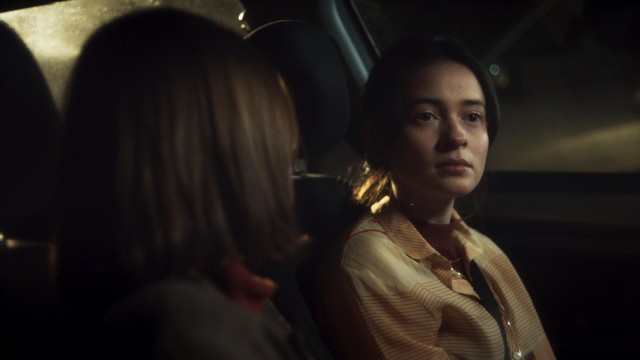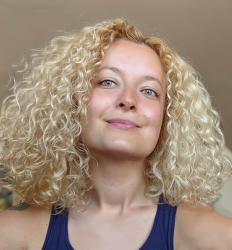The first time I was sexually assaulted was on a bus on my way to school. I was eight years-old. Then there was the time when I had passed out at a house party, as a teenager, and a boy decided that my alcohol-induced slumber was an invitation to a makeout session. There were a few other instances of harassment that followed years later, but in all honesty, I’ve lost count. What they all have in common, however, is that in the aftermath I would spend countless hours imagining what I should’ve or could’ve said, or done, differently. In her short film BEND, Georgia Goggin decided to rewrite the ending of her own sexual harassment story and the result is exhilarating and thought-provoking in equal measures.
BEND is not a sexual-consent drama. It’s a cleverly manoeuvred story of transformation, from victimhood to vigilantism, and at its core is not a romantic relationship but that of a mother and daughter. Spurred, in part, by harassment she experienced herself, and in part by a difficult conversation with her mum after the Weinstein revelations in 2017, writer/director Georgia Goggin created BEND. Backed by BBC Drama, the 8-minute short has a tightly-packed, twisty and darkly-funny plot, skilfully driven all along by Robin Weaver’s brilliant performance as the mother of the assaulted teenager. Goggin purposefully omits the details of the sexual assault, focusing instead on its aftermath, empowering a whole generation of women and girls living in a post #MeToo world to take back control and change the rules of the game.
All we see in the first minute of BEND is blackness. But whilst we don’t see it, we can certainly hear the sexual advances of a young man forcing himself on a young woman, who’s trying to push him away. When the picture finally resumes we have jumped forward in time, introducing young Emma and her mum Maggie as they arrive at a social gathering, before encountering the father of the boy who assaulted the teenager. Now Maggie has to decide – will she confront him or keep quiet. Scored by a trippy soundtrack featuring Goggin’s vocals, who was channelling her feelings about the sexual harassment she had experienced in her own life, BEND is distinctly NOT harrowing but brilliantly, drily funny, making the film all the more affecting and its takeaway all the more inspiring.
“I would never allow myself to respond the way Maggie does but it’s so, so tempting”
It wasn’t until a Q&A session for Underwire, when Goggin realised that BEND was directly linked to a specific conversation with her mum back in 2017. “I had experienced sustained sexual harassment on a set that year and the conversation with my mum revealed how different things were for her generation, in a way I hadn’t understood before. It brought up a lot of painful stuff. Looking at it now, it’s so obvious: BEND is about a mother and daughter in conflict” – the director shared with S/W – “It is a fantasy. I would never allow myself to respond the way Maggie does but it’s so, so tempting”.
By eschewing the sexual assault in the film, Goggin has ensured that any danger of appearing voyeuristic or sensationalist is effectively eliminated. This is not a story that raises the usual questions – did he do it? Was she asking for it? Did she say ‘NO’? Does she need to say ‘NO’? The film’s sole focus, instead, is on the aftermath of the assault, and more pointedly, on the two heroines’ battles – one, to be heard, acknowledged and supported, and the other to overcome her reluctance for confrontation, in favour of keeping the status quo.

Robin Weaver (L), as Maggie and Isis Hope Lloyd, as Emma.
Robin Weaver is absolutely superb as Maggie. Her timidness, paired with her typically British character trait of bottling up her anger and not wanting to make a fuss is perfectly portrayed. The scene in the car where she lists the names of the few men in their lives who wouldn’t commit sexual assault is painfully funny, and her transformation from this, to the badass woman she becomes at the end of the film, is air-punchingly thrilling to watch.
“When she flips, she’s on fire. I want to be her”
“Maggie is partly inspired by my mum” – the director explained – “Not what she does specifically but the way her temperature rises. My mum has had some heroic flip-outs over the years. I love them so much. When she flips, she’s on fire. I want to be her.”
I love Goggin’s resolve to change her own narrative. I too have mentally rewritten the ending of my harassment stories many times. And although my fantasies tend to take a far more violent turn (think chopping off certain body parts and feeding them to the culprits), BEND’s takeaway of overcoming our fears, of breaking our silence and coming together really does work on every level. It is what makes the film a triumph and its central characters trailblazing role models.

 Serafima Serafimova
Serafima Serafimova